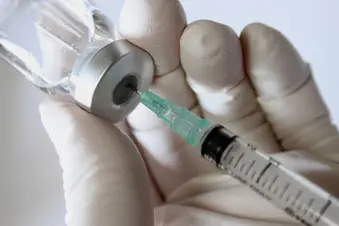
B-cell therapy uses drugs called monoclonal antibodies to attack white blood cells known as B cells that cause nerve damage. The FDA has approved three such drugs for MS.
Ocrelizumab (Ocrevus) treats relapsing forms of MS, including:
- Clinically isolated syndrome
- Relapsing-remitting MS
- Active secondary progressive MS in adults
- Primary progressive MS in adults
It may lower relapses and slow the disease.
Ofatumumab (Kesimpta) also treats relapsing forms of MS, including:
- Clinically isolated syndrome
- Relapsing-remitting MS
- Active secondary progressive MS in adults
Ublituximab-xiiy (Briumvi) is a third treatment for relapsing forms of MS, including:
- Clinically isolated syndrome
- Relapsing-remitting MS
- Active secondary progressive MS in adults
You may have fewer relapses, and the progression of your MS may slow down.
These drugs are new versions of the cancer medication rituximab(Rituxan). Rituximab isn’t approved to treat MS, but doctors sometimes prescribe it as an "off-label" treatment.
How You Get B-Cell Therapy
You get each type of B-cell therapy in a slightly different way.
You get ocrelizumab in a hospital or clinic through an IV -- what doctors call an infusion. You get the first dose in two infusions
spread 2 weeks apart. After that, you need one infusion every 6 months. Treatment sessions may last 3 to 4 hours, so bring something to pass the time.
Ofatumumab comes in a prefilled autoinjector pen you use at home. You inject the medicine into your belly or thigh. Your doctor will show you how. If you don’t like to give yourself shots, ask someone else to help. You start with one shot a week for 3 weeks. Then you switch to one shot each month.
Ublituximab-xiiyis an infusion lasting 4 hours, then a second larger infusion 2 weeks later, then one 24 weeks after the first followed by every 24 weeks The other infusions after the first should last about an hour.
With rituximab, you'd get the medication through an IV in a doctor’s office. You’d get two doses, 2 weeks apart. Then, every 6 months, you’d have two more doses, 2 weeks apart.
B-Cell Therapy Side Effects
Before you start B-cell therapy, you’ll get blood tests for hepatitis B and other infections. If you've had hepatitis B in the past, it could come back if you take these treatments.
Ocrelizumab can lead to an allergic reaction. Doctors call it an infusion reaction. It usually happens during your first treatment. You might have:
- Itching
- Rash
- Nausea
- Hives
- Headache
These symptoms are usually mild, but they can be severe. You’ll get meds before your injection to help with side effects. And a nurse will watch closely for problems during and after your treatment.
You may have a reaction to ofatumumab, also. Where the shot goes in your skin, you may have:
- Redness
- Swelling
- Pain
Ofatumumab also can cause:
- A fever
- Headache
- Body aches
- Tired feeling
- Colds
- Runny nose
- Sinus infections
Ublituximab-xiiy (Briumvi) side effects include:
- infusion reactions
- infections (most commonly upper respiratory tract),
It is not recommended if pregnant. You may be premedicated with a steroid and antihistamine.
Rituximab also can cause infusion reactions. You might have itching, swelling, or a rash where the injection goes in.
Other common side effects are:
- Diarrhea
- Headache
- Nausea
- Muscle spasms
- Insomnia
With any of these treatments, you could be more prone to infections like colds, bronchitis, and herpes. So it’s important to take steps to stay healthy.
Some researchers believe that these treatments can also give you a slightly higher chance of some cancers, especially breast cancer. But experts aren't sure of the connection.
In very rare cases, they may lead to progressive multifocal leukoencephalopathy (PML), a rare brain infection that can be fatal.
B-Cell Therapy Cost
B-cell therapy is very expensive. Be sure to find out if your insurance covers B-cell therapy and how much of the bill it pays.
Show Sources
Photo Credit: Ca-ssis / Getty Images
SOURCES:
Expert Opinion on Biological Therapy: “CD20 monoclonal antibodies for the treatment of multiple sclerosis: up-to-date.”
Croatian Medical Journal: “Therapies for multiple sclerosis targeting B cells.”
National Multiple Sclerosis Society: "FDA Approves Ocrevus™ (ocrelizumab) for People with Primary Progressive MS or Relapsing MS -- First Disease-Modifying Therapy for Primary Progressive MS,” “FDA Approves Kesimpta® (ofatumumab), Similar to Ocrevus®, for Relapsing MS.”
Multiple Sclerosis Trust (UK): “Ocrevus (Ocrelizumab).”
New England Journal of Medicine: “Ofatumumab versus Teriflunomide in Multiple Sclerosis.”
Europe PMC: “Indications for Rituximab Use in an Integrated Health Care Delivery System.”
Autoimmunity Highlights: “Next-generation anti-CD20 monoclonal antibodies in autoimmune disease treatment.”
Novartis: “Kesimpta Medication Guide.”
Multiplesclerosis.net: "Rituximab (Rituxan)."